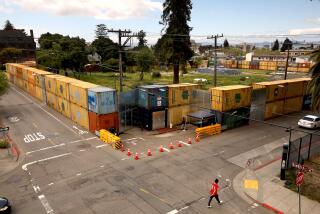Governor Forced to Scale Back Plan for Prisons
- Share via
SACRAMENTO — Confronted with mounting opposition from environmentalists and from Democrats in the Assembly, the Deukmejian Administration on Thursday was forced to scale back its plan to speed prison construction by skirting the state’s strict environmental review process.
During an often tense three-hour hearing, Democrats on the Assembly Public Safety Committee repeatedly berated Administration officials for failing to complete major portions of the governor’s prison program on time. And in a long series of votes, they forced the Administration to accept modifications to its plan that the governor’s aides complained would “put us in an extremely difficult position.”
In essence, the Democratic-controlled committee agreed to let the Administration proceed with an emergency construction program intended to make space for about 5,000 new inmates by next July. To speed the process, the committee voted to allow corrections officials to use a “fast-track” method that would allow the Department of Corrections to complete the environmental protection studies in a shorter period of time.
But it rejected Gov. George Deukmejian’s controversial plan to completely waive the requirement for lengthy environmental impact reports on those projects and on the construction of 10 additional proposed prisons, including one in Los Angeles County.
Those additional facilities, scheduled to be completed by 1989, are to be financed under a $1.2-billion bond issue previously approved by voters. Deukmejian sought the environmental waivers for all future prison projects after complaining that environmental lawsuits were partly responsible for the state’s inability to swiftly bring new prisons on line.
Environmentalists, including the Sierra Club, had challenged the notion of abolishing all environmental reviews because of fears that it would prevent community groups from suing to stop construction of prisons.
Republican Assemblyman Larry Stirling of San Diego, committee chairman, said that despite the Administration’s misgivings, the committee’s action paves the way for a quicker solution to prison overcrowding.
“We were able to move this forward and we have substantial agreement on the environmental aspects,” Stirling said after the vote.
The committee also stripped the bill of its $77 million in financing but pledged to deal with that quickly in a separate measure.
Action by Stirling’s committee was crucial because there are less than three weeks left before the Legislature is scheduled to adjourn for the year.
Rodney J. Blonien, undersecretary in the Youth and Adult Correctional Agency, appeared exasperated at the turn of events throughout the hearing, at one point calling the proceedings a “charade.” Later, he apologized, but said he continued to oppose much of what the committee did.
“We believe our prison system is in a very delicate position and what we came forward with is what we believe is necessary to keep that place together.” Blonien said. “If we seemed upset and on the edge of blowing up today, it’s because we really believe in what we are doing. The action of the committee today, doesn’t give us what we need to keep the place together.”
California’s prison system now contains about 48,000 inmates--about 160% of capacity. The emergency request for 5,000 additional prison beds was viewed as a temporary solution until work can be completed on the state’s overall plan to make room for about 19,000 additional inmates.
Blonien pointed out that the Department of Corrections had completed construction on 3,200 of the 19,000 new prison beds. But he said that much of the planned construction has been stalled by “bureaucratic and environmental hurdles.”
From the beginning of the hearing, however, it was clear that Democrats on the committee would not accept that explanation.
Assemblyman Burt Margolin (D-Los Angeles), who suggested most of the changes in the Administration’s plan, said only two of the proposed prison projects had been delayed by environmental suits.
“What we are doing here reflects the last several years of the Department of Corrections’ record of failure to put on line facilities that were authorized,” Margolin said.
More to Read
Get the L.A. Times Politics newsletter
Deeply reported insights into legislation, politics and policy from Sacramento, Washington and beyond. In your inbox twice per week.
You may occasionally receive promotional content from the Los Angeles Times.










